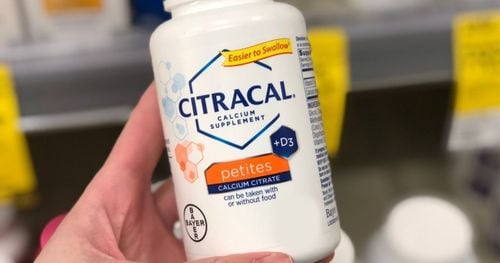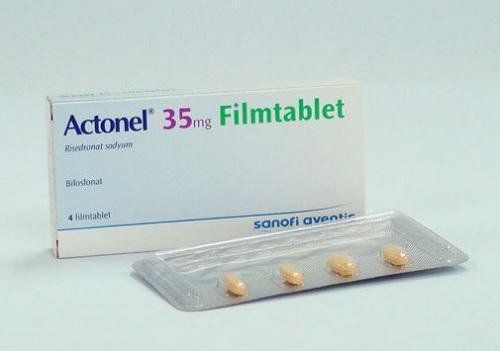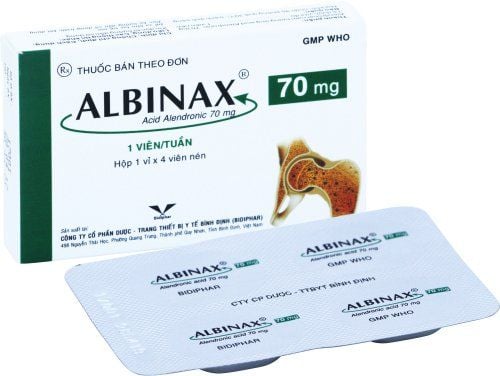This is an automatically translated article.
Risedronate is a Pyridinyl bisphosphonate with affinity for Hydroxyapatite crystals in bone and inhibits osteoclasts, thereby reducing osteoclastic activity and maintaining bone mineralization. This is the main active ingredient of Residron, so what does Residron do?1. What is Residron?
Residron contains the active ingredient Risedronate, which is an inhibitor of bone resorption and treatment of osteoporosis of the Bisphosphonates group. Residron is only available with a prescription from a doctor.Residron is made in the form of tablets with 2 different levels of Risedronate, 35 mg, 150 mg. Risedronate is a drug belonging to the group of non-steroidal drugs Bisphosphonate, a drug used to treat bone diseases because it directly affects the skeleton, making bones less likely to break. Risedronate, when combined with hydroxyapatite in bone, acts as an anti-osteoporotic agent. At the cellular level, Risedronate inhibits osteoclasts, which normally adhere to the bone surface but have reduced osteoclastic activity.
In histological examination of mice, dogs and guinea pigs, treatment with Risedronate has been shown to reduce bone turnover (reduce the frequency of activity, i.e. the proportion of bone remodeling sites that are activated). ) and reduced bone resorption at sites of remodeling.
In pharmacodynamic and clinical studies, a decrease in biochemical markers of bone turnover was observed within 1 month, with maximal results in 3-6 months.
2. What does Residron do?
Residron is used to treat some of the following conditions:
Residron is indicated in the treatment and prevention of osteoporosis in postmenopausal women; Indications for the use of Residron to prevent fractures in postmenopausal women with osteoporosis; Residron is used to treat osteoporosis in men.
3. Characteristics of absorption - distribution - metabolism - elimination of the drug Residron
Absorption: After oral administration, the drug Residron is absorbed relatively quickly, about 1 hour and is independent of the dose. The mean oral bioavailability of Residron was 0.63% and decreased when Residron was taken with food. The bioavailability of Residron in men and women is similar. Distribution: The volume of distribution of Residron at steady state concentrations in humans is 6.3 l/kg and approximately 24% of the drug is bound to plasma proteins. Metabolism: There is no evidence of systemic metabolism for the active substance Risedronate sodium. Elimination: Approximately half of the absorbed dose of Residron is excreted in the urine within 24 hours; unabsorbed drug is excreted unchanged in the faeces. Pharmacokinetic characteristics of the drug Residron in a special patient group:
Elderly: No dose adjustment of Residron is required due to similar bioavailability, distribution and elimination in the elderly (age > 60 years). compared to young people. Renal Impairment: Compared with subjects with normal renal function, the renal clearance of Risedronate sodium was reduced by 70% in patients with a creatinine clearance of about 30ml/min. However, dosage adjustment of Residron is not necessary in patients with mild to moderate renal impairment (Clcr ≥ 30 ml/min). Only the use of Risedronate or Residron is not recommended in patients with severe renal impairment (Clcr < 30 ml/min). Children: Residron is not recommended for use in children under 18 years of age due to insufficient data on safety and efficacy in this population.
4. Dosage of Residron and instructions for use
The recommended dose of Residron for adults is: 1 tablet of 35 mg per week (taken on a certain day of the week). If you forget to take 1 dose of Residron, you should take it the next day when you remember, then still take 1 Residron pill per week on the selected day, do not take 2 Residron 35mg pills on the same day.
How to take Residron:
Should take Residron on an empty stomach, at least 30 minutes before breakfast or at least 2 hours before other meals or take Residron at least 30 minutes before going to bed. Swallow Residron tablets whole (do not break, suck or chew) with 1 glass of water about 120 ml. After swallowing the Residron tablet, the patient should keep an upright position for at least 30 minutes after taking it to help the Residron drug reach the stomach easily (do not lie down within 30 minutes after taking the Residron tablet); Avoid taking Residron at the same time as vitamin D, calcium; The patient's diet should include products containing calcium and vitamin D (eg, dairy products). Therefore, calcium and vitamin D supplements are needed if the diet is inadequate. Severe overdose of Risedronate may lead to a decrease in serum calcium and phosphorus in some patients. In addition, in some cases, there were signs of hypocalcemia. Overdose management: patients should drink milk or antacids containing magnesium, calcium or aluminum to bind risedronate sodium contribute to reduce drug absorption. In case of severe overdose of Residron, family members should take the patient to the hospital immediately for gastric lavage treatment or intravenous calcium can be administered to restore ionized calcium, helping the patient to reduce symptoms. and symptoms of hypocalcemia.
5. Contraindications of the drug Residron
Contraindicated to use Residron drug in the following cases:
People with hypersensitivity to Risedronate or to any component of Residron; Hypocalcemia; Severe renal impairment with creatinine clearance < 30 ml/min; Esophageal abnormalities (stricture, inability to dilate); Inability to stand or sit for at least 30 minutes; Pregnant; Breastfeeding women; Children and adolescents under 18 years of age.
6. Drug interactions of Residron
Concomitant administration of Residron with drugs containing polyvalent cations (such as calcium, magnesium, iron and aluminum) may interfere with the absorption of the active substance Risedronate. These drugs should be taken at a different time of day, not the same time as taking Residron;
Patients can take Residron at the same time as estrogen supplements if the doctor has carefully considered;
Residron is not metabolized in the body, this drug does not induce the enzyme P450 and is less protein bound.
7. Side effects of the drug Residron
Most adverse effects of Residron are mild to moderate in severity, usually do not require discontinuation of treatment.
Common side effects of Residron:
Nervous disorders: Headache; Digestive disorders: Abdominal pain, dyspepsia, nausea/vomiting, diarrhea/constipation; Musculoskeletal disorders: Bone pain, myalgia, arthralgia. Uncommon side effects of Residron:
Digestive disorders: Gastritis, esophagitis, duodenitis, difficulty swallowing; Eye disorders: Iritis; Serum electrolyte disturbances such as: hypocalcemia, hypophosphataemia. Rare side effects of Residron:
Immune system disorders: Hypersensitivity reactions angioedema, rash, itching; Digestive disorders: glossitis, esophageal stricture; Leukopenia, liver enzyme disorders.
8. Be careful when using Residron
Efficacy of bisphosphonates in the treatment of osteoporosis is associated with low bone mineral density and/or fracture. However, the elderly or people with clinical risk factors leading to fracture are still not a basis for conducting osteoporosis treatment with Bisphosphonate. There is not much evidence on the supportive effect of bisphosphonate drugs including risedronate in the elderly (over 80 years old);
Bisphosphonate can cause esophagitis, gastritis, esophageal ulcer, peptic ulcer. Therefore, caution should be exercised when administering Residron to patients with esophageal motility disorders who cannot hold an upright position for at least 30 minutes...;
Prescribers should emphasize the importance of following Residron dosing instructions and alerting them to signs or symptoms of esophageal irritation. Patients should be educated about symptoms of severe esophageal irritation such as: dysphagia, pain on swallowing, pain behind the sternum, heartburn;
Treatment of hypocalcaemia should be stabilized before initiating treatment with Residron. Other disorders of bone and mineral metabolism should be treated concomitantly with Residron. Residron contains the active ingredient Risedronate, which is an inhibitor of bone resorption and treatment of osteoporosis of the Bisphosphonates group. Residron is only available with a prescription from a doctor. Therefore, to ensure the effectiveness of treatment and avoid side effects, users need to strictly follow the instructions of the prescribed doctor.
Follow Vinmec International General Hospital website to get more health, nutrition and beauty information to protect the health of yourself and your loved ones in your family.
Please dial HOTLINE for more information or register for an appointment HERE. Download MyVinmec app to make appointments faster and to manage your bookings easily.













